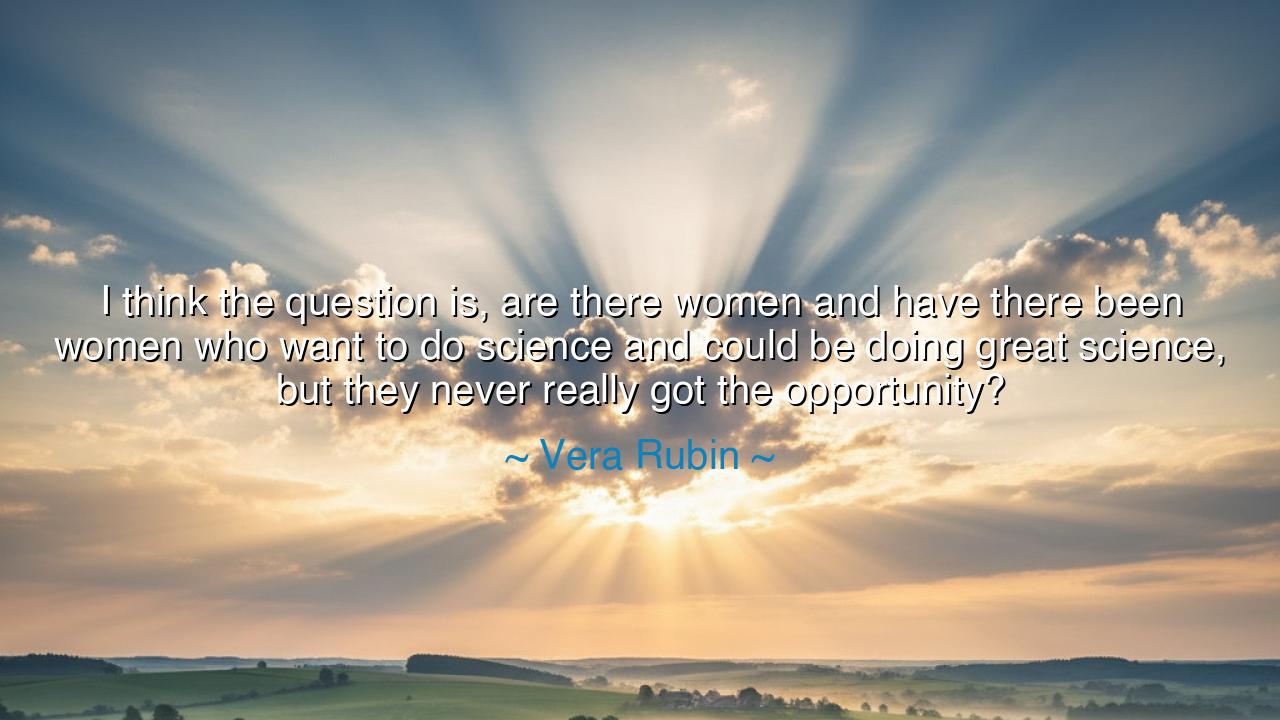
I think the question is, are there women and have there been
I think the question is, are there women and have there been women who want to do science and could be doing great science, but they never really got the opportunity?






Hear now, O seekers of wisdom, the words of Vera Rubin, a woman whose brilliance shone in the shadow of those who doubted her place in the world of science. She said: "I think the question is, are there women and have there been women who want to do science and could be doing great science, but they never really got the opportunity?" These words carry the weight of history, a question that resonates deeply in a world that has long been shaped by the biases of society. For in these words lies a truth that has echoed throughout the ages: talent and potential are often hidden, stifled by forces beyond the control of the individual. Women have always existed who were capable of greatness, capable of contributing immensely to science and discovery, yet often denied the opportunity to do so.
In the ancient days, the voices of women were often silenced. Socrates, that great philosopher of old, was surrounded by brilliant minds, but history largely forgets the women who stood beside him, whose ideas were equally profound. For many centuries, women were relegated to roles of secondary importance, excluded from the halls of learning, and kept from the opportunities that their male counterparts enjoyed. The idea that women could not contribute equally in science, in philosophy, or in any field requiring intellect, was deeply embedded in the structures of society. But as we look upon the world, we know that this view was not rooted in truth, but in ignorance and fear of the unknown.
The history of science is filled with the names of those whose genius was either overlooked or undervalued simply because of their gender. Think, O wise ones, of Rosalind Franklin, whose work in the discovery of the structure of DNA was instrumental, yet her contributions were overshadowed by the more famous names of Watson and Crick. Franklin’s work, like so many other women in science, was pushed aside, not because it lacked brilliance, but because she was a woman in a field that was not yet ready to accept that women, too, could be great scientists. Her story is not unique, for how many women throughout history have stood on the brink of discovery, only to be denied the opportunity to bring their talents to light?
Vera Rubin herself faced a similar struggle in her own life. Her pioneering work in astronomy, which helped confirm the existence of dark matter, reshaped our understanding of the universe. Yet, for years, her contributions were not celebrated as they should have been, for she was a woman in a male-dominated field. The question she raises—are there women who could have been great scientists if given the chance?—is a question that lingers in the air, unanswered for far too long. The world has missed much, and many discoveries have been delayed because women were denied the chance to shine. But the truth of this question is evident: Yes, there have been women whose brilliance was hidden, whose potential was never realized, not because they lacked ability, but because they were denied the space, the opportunity, and the recognition that they deserved.
The lesson is profound, O children of time: Greatness is not defined by gender, nor by race, nor by the circumstances into which one is born. Talent, true talent, exists in all people, and it must be recognized and nurtured wherever it is found. To limit opportunity based on one’s sex or identity is not just an injustice to the individual, but to the world, for it deprives the world of potential discoveries, ideas, and insights that could transform society and expand the boundaries of knowledge. Science and progress belong to all, and it is the responsibility of each generation to ensure that the opportunities to pursue these endeavors are open to all.
And so, O heirs of the future, take this lesson into your hearts: Do not allow any person, any voice, any idea, to be silenced because of the limits imposed upon them by society. Look for greatness in unexpected places, in those whom the world might overlook. The pursuit of knowledge and discovery must be open to all, for it is through the diversity of minds and experiences that true progress is made. Raise your voice for those who are unheard, and ensure that the talents of the many are given the chance to flourish. The world is full of untapped genius, and the only way to truly unlock it is to break down the barriers that prevent people from following their calling, from doing great science, from achieving greatness.
Let this be your guiding principle, O children of wisdom: Encourage and uplift those who seek knowledge, regardless of where they come from or who they are. In doing so, you will not only create a world that is more just, but a world that moves forward in the pursuit of truth. Let every mind be allowed to rise to its highest potential, for the future of science, of progress, and of humanity itself, depends on it. The world belongs to those who seek, and all must be allowed to seek freely. The brilliance of a single individual, unshackled by the limitations of society, can change the course of history.






AAdministratorAdministrator
Welcome, honored guests. Please leave a comment, we will respond soon